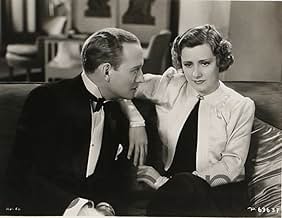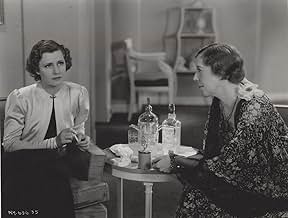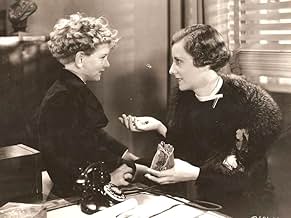Agrega una trama en tu idiomaA prison reformer and a controversial judge fall in love and have a child out of wedlock.A prison reformer and a controversial judge fall in love and have a child out of wedlock.A prison reformer and a controversial judge fall in love and have a child out of wedlock.
- Premios
- 2 premios ganados en total
J. Carrol Naish
- Dr. Sorelle
- (as J. Carroll Naish)
Rafaela Ottiano
- Mrs. Feldermans
- (as Rafaella Ottiano)
Wally Albright
- Mischa Feldermans
- (sin créditos)
Margaret Armstrong
- Miss Jones
- (sin créditos)
Irving Bacon
- Waiter
- (sin créditos)
May Beatty
- Nurse
- (sin créditos)
- Dirección
- Guionistas
- Todo el elenco y el equipo
- Producción, taquilla y más en IMDbPro
Opiniones destacadas
Is anyone in the mood for a cross between Back Street and Night Court? Following those 1931 and 1932 dramas, and combining the stars, comes Ann Vickers, a drama about a strong woman who falls in love with a married man, a judge who doesn't let the law rule his personal life. If you liked both of those precursors, I know what you're renting tonight.
This is an extremely racy movie, and it's a miracle it received a seal of approval from the not-yet mandatory Production Code. The beginning of the film follows Irene Dunne as she has a romance with a soldier, Bruce Cabot. She gets pregnant, and while it's not explicitly spelled out, it's made extremely clear that she goes to Havana to have and recover from an abortion. She's seen resting, wincing, and crying, and no further mention is made of her impending pregnancy. If you don't know how much of a big deal that was to include in a 1933 movie, you're probably not ready to watch it yet.
Her best friend, Edna May Oliver, is another strong female figure from the silver screen, so it's no wonder Irene gets back up on her feet and takes another stab at life. This time, the strong feminist takes a job at a women's prison. This is one of those great silver screen flicks that show how terrible prison conditions were, as well as the interactions between female prisoners and the process of becoming a hardened criminal. Irene tries her hand at drastic prison reform, but since she's a woman and she's trying to improve conditions for women, she's ignored, belittled, and dismissed. This is Irene Dunne, so don't think for a second she'll take that treatment lying down.
Where does Walter Huston come in? you might be asking. I'm sorry to tell you, you're going to have a very long wait ahead of you until he shows up. Keep in mind the movie is called "Ann Vickers" not "Judge Dolphin". He has such talent, it's too bad he doesn't take up more screen time, but since he is so talented, he adds a lot to the scenes he's in. Among the supporting cast, you'll see Conrad Nagel, Mitchell Lewis, Rafaela Ottiano, and J. Carrol Naish. Check this forgotten drama out if you like Irene Dunne, racy pre-Code movies, or early feminist pioneers. This movie is screaming for a remake, so don't be surprised if one of the top modern actresses takes on his powerful role in the future.
This is an extremely racy movie, and it's a miracle it received a seal of approval from the not-yet mandatory Production Code. The beginning of the film follows Irene Dunne as she has a romance with a soldier, Bruce Cabot. She gets pregnant, and while it's not explicitly spelled out, it's made extremely clear that she goes to Havana to have and recover from an abortion. She's seen resting, wincing, and crying, and no further mention is made of her impending pregnancy. If you don't know how much of a big deal that was to include in a 1933 movie, you're probably not ready to watch it yet.
Her best friend, Edna May Oliver, is another strong female figure from the silver screen, so it's no wonder Irene gets back up on her feet and takes another stab at life. This time, the strong feminist takes a job at a women's prison. This is one of those great silver screen flicks that show how terrible prison conditions were, as well as the interactions between female prisoners and the process of becoming a hardened criminal. Irene tries her hand at drastic prison reform, but since she's a woman and she's trying to improve conditions for women, she's ignored, belittled, and dismissed. This is Irene Dunne, so don't think for a second she'll take that treatment lying down.
Where does Walter Huston come in? you might be asking. I'm sorry to tell you, you're going to have a very long wait ahead of you until he shows up. Keep in mind the movie is called "Ann Vickers" not "Judge Dolphin". He has such talent, it's too bad he doesn't take up more screen time, but since he is so talented, he adds a lot to the scenes he's in. Among the supporting cast, you'll see Conrad Nagel, Mitchell Lewis, Rafaela Ottiano, and J. Carrol Naish. Check this forgotten drama out if you like Irene Dunne, racy pre-Code movies, or early feminist pioneers. This movie is screaming for a remake, so don't be surprised if one of the top modern actresses takes on his powerful role in the future.
"Ann Vickers" is an adaptation of Sinclair Lewis' book about an unwed social worker who becomes pregnant during World War I and is subsequently abandoned by her lover. It is a valuable social commentary on the mores and folkways of the time (1933) and explores the double standard then existent that condemned a woman for `loose living' while exonerating a man. The most interesting aspect of the film to me was the fact that it was almost a mirror's image of the sea change that took place in morals during 1920's in the aftermath of World War I.
RKO couldn't have picked a better actress to play the part of Ann Vickers. Irene Dunne was young, sensitive, brave, intelligent everything the `modern woman' of the day was supposed to be. Her early professional career was marked by a series of skillfully done tearjerkers of which "Ann Vickers" is one of the better ones.
I highly recommend this movie. Walter Huston did a fine job as Ann's second love, and the man who restored her faith in a loving relationship. It's well directed and filmed and is a wonderful insight into life in the U.S. from just after World War I up until the middle of the Great Depression.
RKO couldn't have picked a better actress to play the part of Ann Vickers. Irene Dunne was young, sensitive, brave, intelligent everything the `modern woman' of the day was supposed to be. Her early professional career was marked by a series of skillfully done tearjerkers of which "Ann Vickers" is one of the better ones.
I highly recommend this movie. Walter Huston did a fine job as Ann's second love, and the man who restored her faith in a loving relationship. It's well directed and filmed and is a wonderful insight into life in the U.S. from just after World War I up until the middle of the Great Depression.
It is doubtful if, at this point in time, anyone needs to be reminded of the consistent excellence of the versatile Irene Dunne, whose presence enhanced drama, comedy and musical films for many years. ANN VICKERS recalls to us how effective her subtle talent was even early in her career, playing a character alternately strong and vulnerable in a story too crowded with incident to give its major players the room they require to draw the characters fully. As a capable and resolute professional woman involved in social work and prison reform, Dunne's title character is curiously susceptible to the less-than-worthy men she finds more appealing than the steady earthbound types she encounters but does not favor. This contradictions accounts for a large part of the interest in her character, discreetly but firmly abetted by the nuances of yet another outstanding performance. Irene Dunne is perhaps the most reliable of all leading ladies. If you share the admiration of many for her work, this somewhat obscure picture will not disappoint you.
Ann Vickers (1933)
** (out of 4)
Static version of Sinclair Lewis' play has Irene Dunne in the title role of a social worker who gets dumped by an American soldier (Bruce Cabot) and then puts all her attention on her work. She eventually falls for a controversial judge (Walter Huston) but this here might cost her everything she's worked for. This RKO film was produced by Merian C. Cooper the same year he made King Kong but that's the only thing the two films have in common. Dunne is good in her role but the film is all over the place and it's easy to see that the film is trying to cover several parts of the book but can't take everything in within the short running time. Huston stays under control and gives a winning performance as does Cabot and Conrad Nagel in his supporting role. Edna May Oliver and J. Carrol Naish also have small roles.
** (out of 4)
Static version of Sinclair Lewis' play has Irene Dunne in the title role of a social worker who gets dumped by an American soldier (Bruce Cabot) and then puts all her attention on her work. She eventually falls for a controversial judge (Walter Huston) but this here might cost her everything she's worked for. This RKO film was produced by Merian C. Cooper the same year he made King Kong but that's the only thing the two films have in common. Dunne is good in her role but the film is all over the place and it's easy to see that the film is trying to cover several parts of the book but can't take everything in within the short running time. Huston stays under control and gives a winning performance as does Cabot and Conrad Nagel in his supporting role. Edna May Oliver and J. Carrol Naish also have small roles.
To call Ann Vickers a women's picture may technically be accurate--it was, indeed, adapted by Jane Murfin, also responsible for 1939's The Women--but it's much more than that. Quite simply, this is one of the best dramas ever produced in Hollywood. Written with delicacy and tenderness, yet planted firmly in the cruel realities of life, Ann Vickers includes a tour de force performance by Irene Dunne, ably supported by the wonderful Walter Huston as her lover, and Conrad Nagel and Bruce Cabot as would be paramours. There are some incredibly powerful moments here, especially during the prison scenes, and Dunne and Huston are magical whenever they're on screen together. Certainly daring by the standards of the time, Ann Vickers is a refreshingly honest and still topical masterpiece.
¿Sabías que…?
- TriviaSome objections were made by the Hays Office concerning the plot of the first draft of the screenplay, where Ann marries Captain Resnick and then has an affair with Barney. The plot was changed to Ann being seduced by the Captain with the offense somehow deemed less if only one of the parties in the adulterous affair is married. No reference is made about any abortion in the trip to Havana, and in the released print the cause of death of Ann's baby girl is never mentioned. RKO applied for an "Approved" certificate in 1935, when the production code was more rigorously enforced, but they were informed that no certificate would be given because of the film's attitude towards adultery.
- ErroresAlthough the first part of the picture takes place in 1918, all of Irene Dunne's hairstyles and clothes are strictly in the 1933 mode, and continue as such through the decade of the 1920s which follows.
- Citas
Barney Dolphin: [last lines]
Matthew Dolphin: Who are you?
Barney Dolphin: Well, son, i refuse to answer without advice of counsel.
- Créditos curiososThe opening credits are printed in the pages of the novel. They are revealed by a man's hand opening the book and turning the pages.
- ConexionesFeatures Her Man (1930)
- Bandas sonorasSmiles
(1917) (uncredited)
Music by Lee S. Roberts
Lyrics by J. Will Callahan
Played by a band for dance music at the Lorlears Hook Settlement House
Whistled by Sam Hardy
Danced by Sam Hardy and Helen Cromwell and other couples
Selecciones populares
Inicia sesión para calificar y agrega a la lista de videos para obtener recomendaciones personalizadas
Detalles
- Fecha de lanzamiento
- País de origen
- Idioma
- También se conoce como
- Sinclair Lewis' Ann Vickers
- Locaciones de filmación
- Productora
- Ver más créditos de la compañía en IMDbPro
Taquilla
- Presupuesto
- USD 303,000 (estimado)
- Tiempo de ejecución1 hora 16 minutos
- Color
- Relación de aspecto
- 1.37 : 1
Contribuir a esta página
Sugiere una edición o agrega el contenido que falta

Principales brechas de datos
By what name was Ann Vickers (1933) officially released in Canada in English?
Responda
































